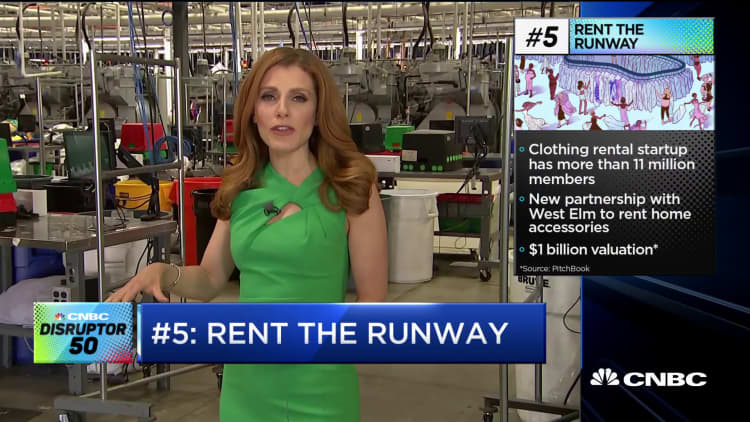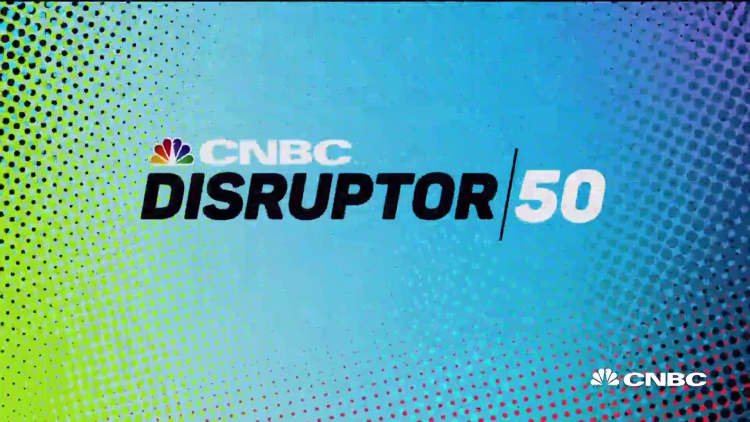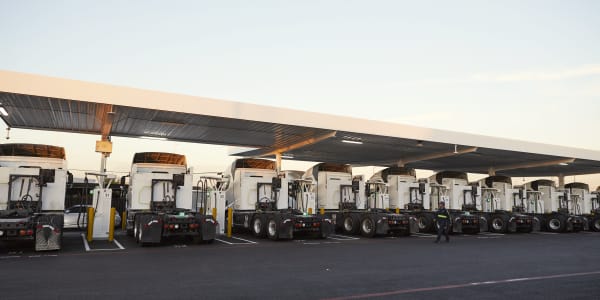The 2019 CNBC Disruptor 50 list has a first: One of the CEOs, Rent the Runway's Jennifer Hyman, is currently out on parental leave with her second child. A second, 23andMe's Anne Wojcicki, is nearing her due date and about to take parental leave as well.
Just 16% of civilian workers in the U.S. have access to paid family leave, according to the December 2017 National Compensation Survey by the Bureau of Labor Statistics. But with persistent gender gaps across leadership in a range of industries, corporate giants and start-ups alike are increasingly looking to improve benefits, in part to keep women in the workplace after they have children.
"Men and women both deserve to take this really special time when they have a newborn at home and bond with the newborn and be with their family," said Hyman in a phone interview while pumping breast milk for her two-week-old baby. "If the woman is really the only one at home at the beginning, it sets up a dynamic where she's the one in charge of her kids and the one in charge of childcare. Given how much work that is, it will set her back in her career if that's not equally distributed with her husband."

Hyman says she plans to take three to four months off from running the company, which rents clothing accessories and home décor and is ranked No. 5 on the 2019 Disruptor 50 list. Her leadership team will run the company day to day, while from home she checks in and reads emails, with plans to attend a board meeting.
Yahoo's former CEO Marissa Mayer famously returned to work two weeks after giving birth to her first child, building a nursery in the office. Hyman says while she won't check out entirely, in contrast, she wants to demonstrate to her employees that they can really take the three months of paid leave and two months of flexible leave that the company allows. "It's really important as the CEO to show all my employees that they can be rock stars at work and also take time away from work to be with their families during amazing moments like parental leave and during difficult moments like bereavement leave."
Expanding benefits in tight labor market
About a year ago Rent the Runway expanded its benefits that corporate employees received to all 1,800 of its workers, including its hourly employees working at its warehouse, customer service and stores. Now all of those employees have equal access to leave for bereavement, a new baby, family sick leave or a sabbatical. Hyman says the expense is worth it, because of the cost of acquiring and training new employees and, on the flip side, the value of having tenured employees, who are far more productive.
"Our distribution center is in New Jersey, one of the most competitive places for warehouse talent in the U.S.," says Hyman. "It's much more expensive for me to try to recruit new talent and train them in dry-cleaning, quality control ... than it is to actually provide an equal life benefit to those employees."
Hyman says that in the past year, the company has seen higher loyalty and lower employee churn.
Men and women both deserve to take this really special time when they have a newborn at home and bond with the newborn and be with their family.Jennifer HymanRent the Runway CEO
"As CEO, my compensation is much higher than the average warehouse employee; however, we shouldn't be distinguishing whose newborn child is more important, or whose sick parent is more important, or whose bereavement leave is more important," Hyman said. She says that the only time she would not be able to take parental leave and turn day-to-day operations over to her team is when she is fundraising. Rent the Runway has raised over $540 million from investors, closing its most recent round this spring.
More from CNBC Disruptor 50:
Inside Impossible Foods' mission to mass-produce the fake burger
Uber CEO says Elon Musk is wrong about robo-taxi timing
This app has saved Americans $10 billion on prescriptions so far
Across the country at 23andMe's Mountain View, California, headquarters, CEO Anne Wojcicki is in her third trimester, with her third child, but the company was not yet ready to discuss her plans for maternity leave beyond indicating the CEO will take some time off. But similar to Rent the Runway, comprehensive parental leave is central to the personal genomics company's benefits.
Head of recruiting Jennifer Mease, who is pregnant herself, explained 23andMe's policy to give both new moms and new dads 16 weeks of 100% pay. "It gives employees the confidence that they're cared for. This feeling creates a more productive, invested employee," says Mease.
23andMe, which ranked No. 46 on this year's CNBC Disruptor 50 list, also offers family planning benefits: up to $20,000 for fertility-related expenses and surrogate fees. And to help parents once kids are born, the company offers up to 10 days paid of subsidized child-care or elder-care backup.

"The free food and the open work space environment are table stakes in Silicon Valley. These types of family planning benefits really do retain employees and differentiate ourselves," Mease said. Taking care of its 625-plus employees' health ties in to the company's mission of helping 23andMe consumers understand their own health.
Companies are increasingly investing more in benefits, particularly parental leave, to attract and retain top talent. A 2018 survey of the Society for Human Resource Management found that over one-third of companies increased their overall benefits offerings in the past year, with about a quarter of companies increasing leave, family-friendly, and flexible working benefits.
While more companies are offering a broader assortment of types of leave, including paid paternity leave, as well as leave for adoption and foster care, larger organizations are more likely to offer these benefits than smaller ones. Paid maternity leave was offered by 60% of organizations with 10,000 or more employees, and only by 31% of organizations with fewer than 500 employees. The organization says the financial advantage of offering these benefits is clear, including increased commitment to the organization, lower incidence of maternal depression, and reduction in health-care costs due to higher rates of breastfeeding.
The vast majority (92%) of employees surveyed by SHRM reported that paid leave is important to their overall job satisfaction. However, just 73% reported being satisfied with paid leave offered at their organization.






